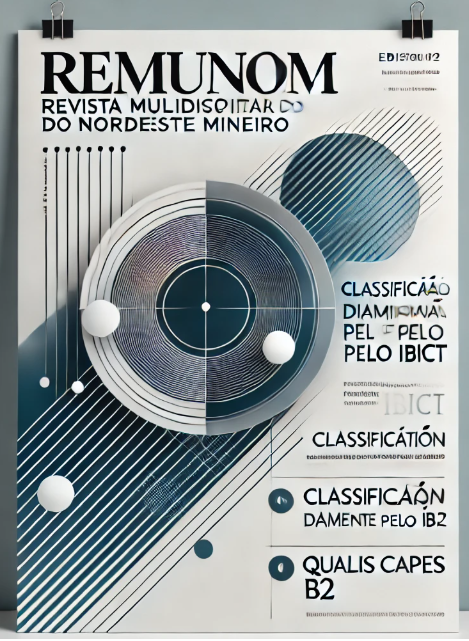ELABORAÇÃO DE OBJETOS DE APRENDIZAGEM POR MEIO DE APLICATIVOS EDUCACIONAIS: ANÁLISE DA FORMAÇÃO PROFISSIONAL DOCENTE
DOI:
https://doi.org/10.61164/rmnm.v1i3.3546Keywords:
Dialogismo Bakhtiniano; Objetos de Aprendizagem; Formação Docente.Abstract
It is essential to foster new knowledge linked to a professional teaching culture in which the development of teaching materials is established in a more autonomous and contextual way. When it comes to teaching Portuguese, consolidating pedagogical autonomy involves increasing access to digital media that provide teachers with content and resources to create more personalized teaching materials that are suited to the specific needs of their students. In this sense, given the lack of access teachers have to varied quality teaching materials, as well as the difficulties in understanding the guidelines of the BNCC in order to create teaching tools based on this document, this work proposal, based on the theoretical foundations of Bakhtinian dialogism, sets itself the general objective of contributing to research in the field of applied linguistics through the development of an educational application that assists in the development of teaching materials for the teaching of Portuguese language in basic education. The methodology used in the research project entitled “Educational application for the creation of teaching material for Portuguese as a mother language”, in which we bring the discussions to this article, was inspired by Design Thinking, that is, an interactive approach centered on people and problem solutions (BROWN; WYATT, 2010; BROWN, 2017). The expected results include the realization of the students' teaching identity and the app's support for the development of learning objectives for Portuguese language teaching.
References
BAKHTIN, M. (1992/2010). Estética da criação verbal. Trad. Paulo Bezerra. São Paulo: Martins Fontes.
BAKHTIN, M. (2006). Marxismo e filosofia da linguagem. Tradução de Michel Lahud e Yara Frateschi Vieira. 13 ed. São Paulo: Hucitec.
BATISTA, A. A. G.. (2003) In: ROJO, R.; BATISTA, A. A. G. Livro didático de língua portuguesa, letramento e cultura da escrita. São Paulo: Mercado de Letras. p.25-67.
BRASIL. (2019). Ministério da Educação. Base Nacional Comum Curricular.
BRITO, G.S. e PURIFICAÇÃO, I. (2014). Educação e novas tecnologias- um (re) pensar. Curitiba, Intersaberes,
BROWN, T.; Wyatt, J. 2010. Design Thinking for Social Innovation. Development Outreach. © http://hdl.handle.net/10986/6068 License: CC BY 3.0 IGO.”~
BROWN, T. (2017: Design thinking : uma metodologia poderosa para decretar o fim das velhas ideias / Tim Brown; tradução, Cristina Yamagami. Rio de Janeiro: Alta Books.
CORACINI, M. J. (Org.). (São Paulo: Pontes 1999) . Interpretação, autoria e legitimação do livro didático. São Paulo: Pontes.
COSSON, R. (2004). Letramento literário: teoria e prática. São Paulo: Contexto, 2006
FOUCAULT, M. (1995). O sujeito e o poder. IN: RABINOW, P., DREY-FUSS, H. Michel Foucault: uma trajetória filosófica. Rio de Janeiro; Forense Universitária.
GUIMARÃES, A. M. M.; KERSCH, D. F. (org). (2012). Caminhos da construção: projetos didáticos de gênero na sala de aula de língua portuguesa. Campinas: Mercado de Letras.
GUIMARÃES, V.S. (2004). Formação de professores: saberes, identidade e profissão. Campinas: Papirus,
JARDIM, M.L e SOUZA, G.Q. (2021). Metodologias ativas na prática pedagógica. Curitiba: Editora Appis.
MAINGHENEAU, D. (2017). Discurso e análise do discurso. São Paulo: Contexto.
NASCIMENTO, Elvira Lopes (Org.). (2009). Gêneros textuais: da didática das línguas aos objetos de ensino. São Carlos: Claraluz.
NIETSZCHE, F.W. (2009). A genealogia da moral. Trad. Mario Ferreira dos Santos. Rio de Janeiro: Vozes,
NIETSZCHE, F.W. (1992b).O nascimento da tragédia ou helenismo e pessimismo. Trad. J. Guinsburg. São Paulo: Companhia das Letras.
PERRENOUD, P. (2000). Pedagogia diferenciada: das intenções à ação. Trad. Patrícia Chittoni Ramos. Porto Alegre: Artmed. .
TARDIF, M. (2023). Saberes docentes e formação profissional. Petrópolis: Vozes.
VERNANT, J.P. (1990). Mito e pensamento entre os gregos. Trad. Haiganuch Sarian. Rio de Janeiro: Paz e Terra, 1990.
VICENTE, J. (1994). Subsídios para uma didáctica comunicacional no ensino-aprendizagem da filosofia. Revista Filosófica de Coimbra. V- 3, n.6, pp.321-358.
VIGOSTSKY, L. (2005). Pensamento e linguagem. São Paulo: Martins Fontes.
ZABALZA, M. A. (2004). O ensino universitário: seu cenário e seus protagonistas. Porto Alegre: Artmed.
Downloads
Published
How to Cite
Issue
Section
License
Copyright (c) 2025 Revista Multidisciplinar do Nordeste Mineiro

This work is licensed under a Creative Commons Attribution-NonCommercial-ShareAlike 4.0 International License.




